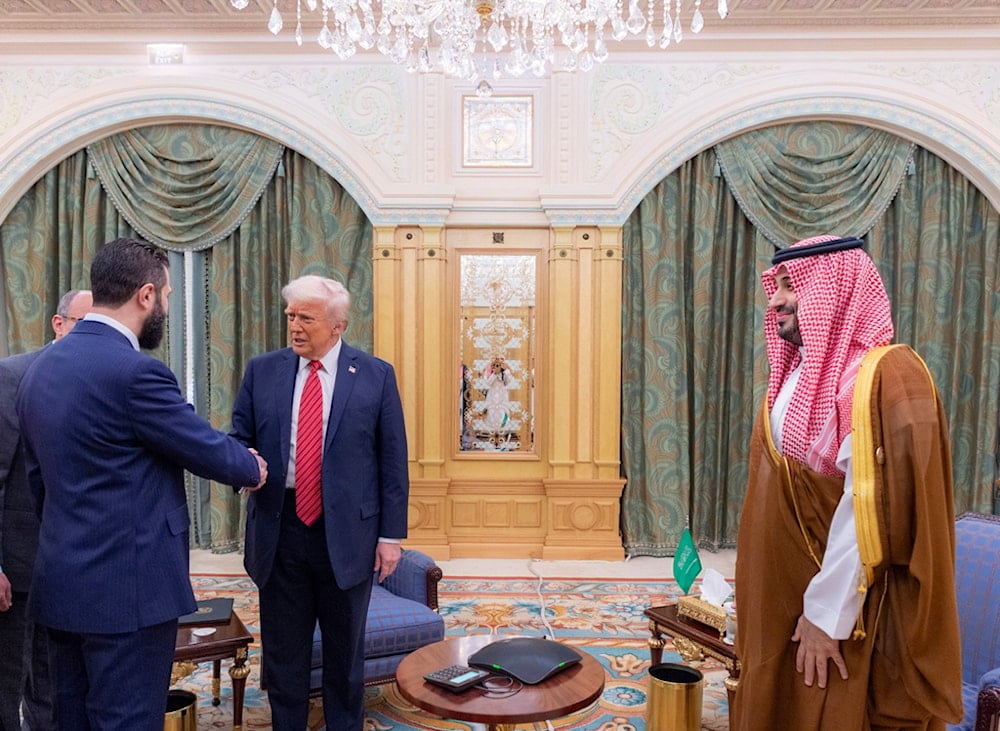Trump regional strategy 'made over Netanyahu’s head': NYT
Trump’s latest Gulf tour signals a major shift in US diplomacy, lifting sanctions on Syria and pursuing talks with Iran, while visibly sidelining "Israel" and its leadership.
-

In this photo released by the Saudi Royal Palace, Syria's interim President Ahmad al-Sharaa, left, shakes hands with President Donald Trump, center, in Riyadh, Saudi Arabia, Wednesday, May 14, 2025, with Saudi Crown Prince Mohammed bin Salman standing on the right (Saudi Royal Palace via AP)
US President Donald Trump’s recent Gulf tour marked a notable shift in US foreign policy in the region, emphasizing new alliances and strategies that largely left "Israel" on the sidelines, The New York Times reported.
At the Saudi royal palace, Trump met with Syria’s new leader, Ahmad al-Sharaa, and announced the lifting of longstanding US sanctions on Damascus.
“Tough guy, very strong past,” Trump said of al-Sharaa, who has a history of ties with Al Qaeda. The US president justified the move by stating he wanted "to give them a chance at greatness."
But "Israel’s" leadership has strongly opposed any recognition of the new Syrian administration. Israeli Prime Minister Benjamin Netanyahu's government has labeled al-Sharaa a “jihadist” and has warned against US normalization with Damascus.
Read more: 'Israel' blindsided by Trumps' Syria sanctions lift: The Times
Netanyahu left out of key US regional moves
Despite years of close cooperation, Trump’s actions reflect a broader Trump-Netanyahu relations reset. While the White House maintains that ties with "Israel" remain intact, Trump's refusal to coordinate key decisions with Netanyahu has not gone unnoticed.
“No not at all,” Trump said when asked if he was sidelining "Israel". “This is good for Israel, having a relationship like I have with these countries, Middle Eastern countries, essentially all of them.”
But Trump sidelining "Israel" has been a recurring theme on this trip. The US president focused his efforts on securing economic agreements and peace talks in the Gulf, visiting Saudi Arabia, Qatar, and the United Arab Emirates, while skipping a stop in "Israel" altogether.
“The overall sense is of shifting attention and perception of interest, mainly to the Gulf States, where the money is,” indicated Itamar Rabinovich, a former Israeli ambassador to the United States.
Rabinovich explained that Trump has shown little interest in working with Netanyahu regarding the war on Gaza because of “a sense that there’s no point."
"Netanyahu has his position, he doesn’t move from it. Hamas doesn’t move from its position. It seems like a hopeless stalemate.”
Read more: Bypassed by Trump, 'Israel' dismayed, silent amid shifting alliances
Trump pursues Iran talks over military action
Trump’s regional efforts have also centered on diplomacy with Iran. In Qatar, the US president stated that US-Iran talks regarding Tehran's nuclear program were “very serious” and that a long-term agreement was possible.
“It would be fantastic,” he said, referring to the potential for a peaceful resolution.
This stance contrasts sharply with the position of Netanyahu, who has repeatedly urged the US to support military strikes against Iran’s nuclear infrastructure. Trump, however, has prioritized negotiation while keeping military options on the table if talks fail.
Read more: 'Israel' concerned, says US withholding info about indirect Iran talks
Strategic decisions without 'Israel’s' involvement
Several high-profile decisions were made during Trump’s tour without consultation with Netanyahu. Earlier this month, Trump declared a ceasefire with Ansar Allah in Yemen, despite the group's ongoing missile launches toward "Israel". One such missile struck Ben-Gurion Airport in Tel Aviv, causing weeks of disruption.
Additionally, the Trump administration negotiated the release of Edan Alexander, the last known American captive in Gaza, without coordinating the effort with "Israel".
While Netanyahu’s office insists that relations remain strong, citing recent visits to the White House and Trump’s assurances, former aides acknowledge the changing dynamic.
“With Biden, Netanyahu could postpone decisions,” said Nadav Shtrauchler, a former advisor to the Israeli prime minister.
“In Trump’s case, as soon as that happens, the decisions are made over Netanyahu’s head. This is a change that worries many people in Israel.”
Read more: Netanyahu and Trump: Shifting ties amid Middle East tensions

 4 Min Read
4 Min Read










